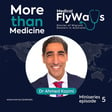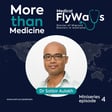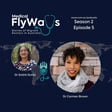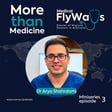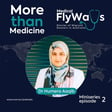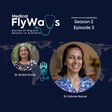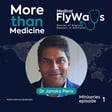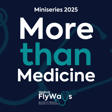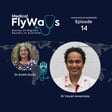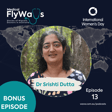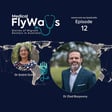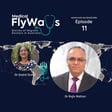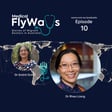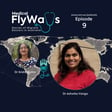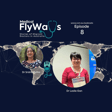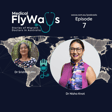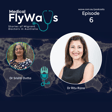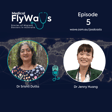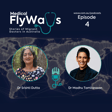Become a Creator today!Start creating today - Share your story with the world!
Start for free
00:00:00
00:00:01

Episode 17 - Dr Nelum Dharmapriya
When opportunity knocked, Dr Neelam Dharmapriya chose sunshine, community, and a bold new chapter in her medical career. In the this episode of Season 2, hear how she built a values-driven clinic in Brisbane, embraced metabolic health after her own diagnosis, and is now empowering patients to take control of their wellbeing.
Recommended
Transcript
Introduction to Dr. Neelam Dharmapriya
00:00:01
Speaker
Medical Flyways, the untold journeys of migrant doctors in Australia.
00:00:13
Speaker
Today we have our guest, Dr. Neelam Dharmapriya, who is a GP and a GP with special interests with lifestyle and metabolic health in North Brisbane. She has several other strings to her bow and we will discuss many of those as we continue chatting with Neelam.
00:00:28
Speaker
I first met Neelam at a fantastic fundraiser held in North Brisbane for a very, very significant charity, which was raising money for those who required palliative care and developing that particular area of service and care for patients in Sri Lanka.
00:00:49
Speaker
So I know how generous she is. And amongst other things, she has started and grown her own practice in North Brisbane, one which I have visited in some of my roles. So welcome, Neelam.
00:01:00
Speaker
Thank you, Shrishti. I know that you have quite a varied career path and you have been and worked in many places.
Why Neelam Moved to Brisbane
00:01:10
Speaker
Can I start with asking what brought you to Australia?
00:01:13
Speaker
Yes, well, you know, i've I've listened to a lot of your guests speaking and I think like a lot of your guests, I think it's the weather that brought me here to Brisbane in particular.
00:01:24
Speaker
But because I graduated and worked for many years in the UK, in the north of England, so in Manchester, which If you know what it's like, it's kind of a little bit grey and miserable most of the time.
00:01:36
Speaker
So after 15 years of living in Manchester, it wasn't anything in particular. It was just we got an opportunity. And i we thought, wow, well, this is the time to take it. my I have two boys.
00:01:50
Speaker
And they were, you know, at the time, 8 and 11. And there was a lot in the UK media at the time about... you know, crime, gun crime in particular. And these were just things that were not particularly driving us, but they were in in our thoughts, my mine and my husband. So I think when we got this opportunity, we thought, well, we should come and check it out. And we arrived, well, we had the opportunity of going anywhere really, but we thought, well, if we're doing it, we might as well make a sea change and come somewhere that is completely different weather-wise than Manchester.
00:02:27
Speaker
And it's been excellent. It was the right choice. ah Do you feel that in terms of weather, profession and the growth, your personal growth and children, what are the positives that you can share with us?
00:02:42
Speaker
Yeah, I mean, it's, I think, It's been amazing for us coming to Australia, coming to Brisbane was the right move. You know, well, one, the weather. I mean, look at it. I mean, aren't we so blessed? It's so beautiful.
00:02:55
Speaker
The fact that I don't have to check every morning, noon and night what the weather is going to be. I mean, that in itself is amazing. It's also why you and I are not in Melbourne. Yes, yes, that's exactly, that that's right. Yes, even though there are lots of positives to Melbourne, I'm told, but I think I'll stick with here.
00:03:13
Speaker
We, I think, arrived in Queensland, in Brisbane, at the right time.
Starting a Medical Center in Narangba
00:03:18
Speaker
So i chose to take a job in Narangba, which is about 35, 40 minutes north of Brisbane. And that was probably because, you know, as an international medical graduate, we had a moratorium that we had to complete. so ah so And this particular suburb at the time didn't have, there was two ah GPs covering this massively growing suburb.
00:03:43
Speaker
So this particular medical center that I came to, I was the first doctor that came there. And the owner had been looking for five years. I don't know why, because it's a lovely suburb.
00:03:55
Speaker
So I think I arrived at the right time in the right place, because ah two years later, my husband and I, we set up our own medical center. We we we bought the land, we built it up.
00:04:08
Speaker
And we set it up. And so that's now been, it's coming up, it's 12 years now since Narangba Doctors was established. And i'm I'm so proud of it. I mean, we actually have sold the business a few years ago, but I'm still working there. But it's ah a real achievement. And we have a very good standing the the community.
00:04:28
Speaker
We are known to provide good service, not just from the doctors, but all nurses, reception, everybody. we That's our focus, you know providing a good service.
00:04:39
Speaker
For my kids, it was like being on the set of Neighbours when they were younger. You know, we'd have, you know, people, just other, the kids, neighbourhood just flowing in and out, jumping in our pool. or that yeah It was just wonderful. it was ah It was exactly the type of lifestyle that I wanted for them because it wasn't the same in England. It's a little bit more formal.
00:05:02
Speaker
you know, the weather plays a part. Yeah, and they're very sporty kids, so they had the opportunity to um you know, take part in all their sport, spend the majority of the their days outdoors.
00:05:13
Speaker
I mean, now they are they are a lot older. They're 23 and 26. So they have long since moved out of home. But I think it really gave them the upbringing that I think a lot of kids do need.
00:05:27
Speaker
My other stuff that I do, all the other, you know, my interests that I have, I think I had the opportunity to develop them here in Australia and Brisbane because I think it's still a growing market here in Brisbane.
00:05:42
Speaker
It's still developing. So there's opportunities for people who want to do things differently. It sounds like it's been a fantastic journey. And I will probably ask here, as you described opening the practice with your husband, and for most people that are not here yet, they might hear it and wonder, there are many that have done it and there are many that haven't.
00:06:04
Speaker
What were the key motivators to consider it at that stage? And what was the biggest challenges? So it was interesting. It was never something that I thought. When when I left England, I was ah a partner at a practice for seven years before I left ah the UK. And I had a very good experience.
00:06:23
Speaker
But I always thought I'd like to just be a doctor. I didn't want to be part of the management because it takes, you know, it's it's a big commitment. So it's saying that, though, the the practice that I...
00:06:35
Speaker
came into, one of the options was that I had the option of of purchasing the practice if I needed to at a later date, the the original practice. And Shrishti, I don't know, didn't have the best experience with the two practices that I worked in before we opened Narangba Doctors.
00:06:55
Speaker
Anyway, it was it was there was a lot of drama. that it was it was with Some instances are very unprofessionally handled and the staff weren't treated well.
00:07:05
Speaker
And these things were really... Bothering me? They're important for you by the side. Exactly. And also having come from a practice where service and taking care of your staff was the most important thing, I really felt that I was, it it wasn't what I, i we I thought we could do a bit better.
00:07:29
Speaker
and And because my husband, he's not a doctor, he's in the financial field and he he said, okay, let's do it. And we got the opportunity of buying this land in Narangba, which you know has is is is a massively growing community with very little infrastructure.
00:07:45
Speaker
So at the time... he He did so much work to actually get, because it was residential land, so to get it and to get it rezoned as a be commercial and um and then the whole process process of building it.
00:07:59
Speaker
I mean, it it was it was a challenge financially. It took everything that we had, we had to borrow from my dad, who was who was so generous and in lending it to us.
00:08:11
Speaker
And we had only just come, it was only two years, because we arrived in Brisbane in 2009. And this process started in 2011. were very, very fortunate. eleven we were very very fortunate So what happened in this original practice is that the practice owner, suddenly she decided that all of us, four of us by the by the end of the first year, because was a lovely little growing practice, she decided that we all needed to go. She just literally, she she i was on on holiday and she sent me an email saying, I'm
00:08:46
Speaker
Yeah, don't come back. And, you know, so these kind of funny things happen. It's interesting, isn't it? Because when you come from the UK, you've either been a salary doctor or a partner. Whereas when you come here, and even now, although the number of salaried doctors has obviously shifted in terms of having a few more options, but most of us are what are called independent contractors or tenant doctors.
00:09:09
Speaker
Now, technically, tenant doctors is is the right terminology. So you're actually the person renting the space from the clinic. And so the there can be a contractual obligation, but there isn't absolute, like if there's no real obligation to, it's very relationship-based, isn't it? It's very much relationship-based as to how things will go.
00:09:34
Speaker
and And like many people, it sounds like your initial ones didn't quite land. so So you then had the choice of going and starting a practice or going and working somewhere else.
00:09:45
Speaker
Yes, well, I had to go and work somewhere else because it was so sudden here. I was kind of happily working away and then suddenly told to just leave and then being an IMG trying to make sure that... Find somewhere else, yeah. Yeah, that actually...
Challenges in Practice Management
00:10:00
Speaker
ah um you know, had the availability for us. So, but that meant that there were three other doctors who also were kind of, didn't have a plan.
00:10:11
Speaker
Yes. So when I said, ok this is the plan, this is what I'm planning to do. And because we'd worked together so closely and they said, well, we're coming with you. So we all each went off and did our own thing for a while until the practice was built.
00:10:26
Speaker
And And so when we started the practice, we started with three doctors. And on day one we registered several thousand patients because these were already people who were seeing us and wanted to follow us. So I think I was in a very unique situation where, ah unfortunately, this is not the case for most practice owners who start up their own practice because it does take a long time to build at your list. But Because we started this way, it it just it just flourished.
00:10:57
Speaker
And there was there was already three of us ah full-time working. Three of us started on day one. And then as the practice grew, now there's 10 GPs. Yeah, it's ah we've had to...
00:11:09
Speaker
extend the building as well. And then my husband, not only did he do all the the, you know, kind of the work behind the scenes, he was also the practice manager. And I mean, i must say he is an excellent practice manager, and he is is ah very good at managing people.
00:11:29
Speaker
So I then had the opportunity to say, okay, you take on all of that, I'm just going to be a doctor. And so I would say to even the staff, whos I mean, i would say to them, you know, so I'm the doctor here. You come you can talk to me personally, one-to-one, tell me any issues in terms of from a more, yeah, not a practice manager perspective, just if they want to talk to me, if they want to get an opinion from me, fine. But otherwise, you know, Sajid is the person that you need to go to for practice-related issues. So that really helped.
00:12:05
Speaker
And that was a much easier way to continue. Yeah. Can I just say what I've heard? Because you've just described so well, someone who has developed and maintained really good relationships with their peers.
00:12:20
Speaker
You have had a focus on the values that were important to you, which was service to the community and also nurturing the people that you work with. what you've just described includes not just the doctors, but the other staff members, as well as your husband, who is a practice manager.
00:12:39
Speaker
Because you gave him autonomy over an area which you could have chosen to want to influence as well. So it sounds like you are an awesome leader, Neelam. I mean, that's another bit that I've just learned about you. So it's not always easy to delegate and let some and delegate well.
00:12:55
Speaker
So clearly, and I have actually been to your practice, so I know that it is very well regarded in the community where it is based. including the co-located pharmacy.
00:13:07
Speaker
And so I absolutely know that the values with which you set it up have been achieved in the community as well. So, yeah. Thank you. Thank you, Shrishthi. And I think the other aspects that I'm aware of that developed from it was you were also in a governance role at one stage, which, so the PHN have something called a clinical advisory group So north of Brisbane is kind of considered in two parts, the southern half of north Brisbane and the northern half of north Brisbane. So I know you've you've been involved with that. why I still am. and And I remember quite clearly that you're the one who suggested that I get involved. Yes. And yeah, it's been a very interesting experience because I don't think there was a lot of representation from my part of the world in terms of
00:13:58
Speaker
That area of Narangba, Kabulcha, you know, Moriathu, that area. And I think that is a very high need area, some parts of that. So I think that was really good.
00:14:08
Speaker
And just being part of, you know, kind of being part of a group. And I really, really admire these people, my colleagues who are part of the CAG.
00:14:20
Speaker
because they are so passionate about, you know, what they do and their role in really and seriously taking their role in terms of the investments that are made in general practice, particularly in our region, how money is divided up, the services that are provided, the equity that they try to get through. And even the PHN, you know, i was very naive. I didn't realize how much the PHN invests in general practice and the time, the effort.
00:14:51
Speaker
So I feel really privileged to be part of this group. And, you know, we meet every second month and to see all that the services that are being put together, you know, and and the PHN do take on board a lot of what is said. So I feel that it's, it's a you know, it's that they appreciate the CAG and what they provide. So i yeah, it's great.
00:15:18
Speaker
Awesome. And I do agree with you that I think they're very much focused on patient outcomes and equity, which ah allows to fill the gaps where practices as individual entities might not be able to.
00:15:32
Speaker
like as As you mentioned, that that particular area um has its own demographic challenges in terms of the delivery of healthcare. And I think amongst other things, ah so I'll say this as I know it, which is one day one of my patients came along and said that she'd found this awesome GP who talks about lifestyle and metabolic medicine.
00:15:51
Speaker
And then she went on to explain the things she was doing and how it was working. and And I was like, oh, wow, fascinating. I said, the reason I actually asked her the question of who she was seeing is because I thought I'd send some more patients your way.
00:16:03
Speaker
Which is how I try and work is the is to find people that can help me in in achieving the goals for those patients. And i I certainly have tried to learn around it, but it remains an area of interest, not quite special interest like it is for you.
00:16:22
Speaker
so you want to share a little bit about how you landed there? I mean, I've seen some of your journey through social media, etc. But how did you get
Metabolic Health and Menopause
00:16:30
Speaker
there? Listen, I was trained exactly like all of us are, you know, in in medicine and to diagnose and to treat with medications. That's what we're trained to do.
00:16:42
Speaker
And that was fine. And I thought I was doing a good job. I i i i thought I was a good GP, which, i yeah, you know you know, I was doing what I was was passionate about and I was happy with what I was doing until I started going through menopause.
00:16:58
Speaker
and, ah you know, really struggled during this time, weight gain, not just weight gain, but really kind of things like brain fog, snoring, getting up 100 times at night to go to the to the toilet, you know, all these things that were...
00:17:15
Speaker
was so common in my patients. but And then when I did my blood testing at the age of 50, realizing that I was pre-diabetic and had a lot of risk factors pointing towards heart disease, and I thought,
00:17:30
Speaker
Like, you know, I've always considered myself really healthy. i exercise, I'm, i you know, being Sri Lankan, I do eat a lot, a little bit of carbs, obviously, but I was low fat and, you know, doing all of that.
00:17:43
Speaker
And I couldn't understand, like, how am I sitting here, this healthy person that I considered myself to be, you know, now pre-diabetic and and, you know, all these other issues.
00:17:56
Speaker
And that's when I thought, well, I... I'm doing exactly what I tell my patients to do. So what is it? And then I realized, well, that's why they don't get any better either because we we we just we yeah we're just on this path together. And then I started reading and listening and really studying up about this. And and I did developed this special interest in metabolic health and insulin resistance. And it was such like a revelation to me. it was like, oh my gosh,
00:18:27
Speaker
it this has opened up a whole new, it's not a new area. We all know this stuff, but it's presented in a different light. So more, this is what we call root cause medicine. And unfortunately, that's not how like a traditional medicine is taught.
00:18:45
Speaker
And if you, so that's, you know, and then developing, you know, looking into this and learning about this. I mean, I have worked harder than I've worked in science. in a very long time learning all of this and realized that I'm actually quite nerdy, that I love learning about biochemistry.
00:19:02
Speaker
And I didn't realize that I could like read for hours on this kind of stuff that I learned in, you know, year two in medical school. Yes. So that is what drove this kind of real special interest in nutrition and lifestyle medicine.
00:19:19
Speaker
and And, you know, I realized that a lot of doctors who are in this field have had their own personal experience. So so for me, what happened was just learning about this, just changing the way I ate, really, and really looking at a few lifestyle factors.
00:19:37
Speaker
completely changed my health. Three months later, had lost all the weight, particularly all that belly fat. The brain fog had improved. I'm sleeping. I've never slept as well as I do now.
00:19:51
Speaker
The snoring, I mean, I've snored for 20 years. It's gone. You know, I'm now 55. I do not snow, right? um Prediabetes completely reversed. My blood pressure is sorted. You know, everything, all my metabolic markers reversed.
00:20:07
Speaker
And it was like, oh my gosh, like, how did this happen? And so that was the trigger. And I thought, well, my patients are like me. Like they all come, my peri-postmenopausal women, that's what they talk about. They talk about exactly these symptoms.
00:20:25
Speaker
And I thought, okay, if I can help myself, and being a Sri Lankan woman, it is, I think, a little bit more difficult.
Integrating Metabolic Health into Patient Care
00:20:32
Speaker
So I thought, if I can do this, They certainly can. And that's what got me on this path. and But what I was going to say was that I think every single doctor who's in this kind of metabolic health field have had their own personal experience.
00:20:48
Speaker
And that is what has led this kind of complete change to how they practice medicine, because that's what happened to me. I had to completely change the way I practice medicine, which was really hard because So much of what we've learned, you know, I had to relearn, i had to unlearn um some of the stuff and relearn things.
00:21:11
Speaker
And it's a big ask if you haven't had this personal experience, because why would you do that? You know, I'm I've been a GP now for 30, a doctor now for 30 years. It's a really difficult to ask to, you know, looking at lipids and looking at, you know all the things that we kind of consider. Yeah, I mean, it brings me, it makes me think of something is you're obviously a very good GP to begin with.
00:21:37
Speaker
So when you're doing the metabolic health stuff and it is absolutely an adjunct to the general practice care you're offering the patient already, In regards to unlearning, I'm maybe thinking from the perspective of a learner who's arrived and who's new to Australia, the expectations of patients that come and see us vary. Some will be needing more of the basic care that we offer and others will probably be ready for the special interest level of care that we have to offer. And how do you blend or combine or integrate those two aspects when you're looking after patients?
00:22:17
Speaker
Well, what I do is when people, when somebody comes to see me, really now it doesn't matter because metabolic health, you can, you know, really from the twenty s you can pick up and I think ah If you can get, ah say, a young woman who's come in who possibly has PCOS, for instance, that's a perfect time to start. So anybody, depending on what they come in for, I would say something like, shall we do a metabolic health screen? Shall we do a blood test, a fasting blood test and see where you're at?
00:22:50
Speaker
I don't say anything else. I just say, well, how about we do this? And we just do a blood pressure. I do do some measurements, height, weight, waist measurements. So those, I do kind of those things and say, let's do a blood test looking at your metabolic health. I'll just give a brief description of what that is.
00:23:07
Speaker
And then I get them back and then I show them, okay, this is these are the things that suggest that your metabolic health is good or not so good.
00:23:19
Speaker
And then saying that there's a lot that you can do simply with life, just really from and learning what to eat. that's what That's where I always start because it's not only what you eat. There's a lot to metabolic health.
00:23:34
Speaker
But I think if we start, the easiest place for a lot of people is to manage what they eat because they have a little bit more control over that And listen, Shresti, it's not everybody who comes back and wants to do this. You know, it is it's a big commitment and and so you have to get that person at that right time.
00:23:56
Speaker
And sometimes I might have to kind of, I'm very careful, I don't push anything. And it might be that they come back a few times, it might be over a few years, and then they'll suddenly say, Nailam,
00:24:08
Speaker
Let's do this. Okay. And then once they've got the food element right, what I find is a lot of the other areas improve. So they find that they're not as hungry.
00:24:21
Speaker
Their blood sugar levels are a lot more settled. So therefore, they don't get as much of the the anxiety and those kind of, you know, the cravings. They're not as irritable. They sleep better.
00:24:33
Speaker
they feel that they can kind of get out and do some activity, you know, so it all flows in. And then you kind of look at, it well, let's, and then we look, I mean, I look at gut microbiome, inflammation, add in a little bit of fasting if they're ready for that.
00:24:48
Speaker
So, you know, it's ah it's a gradual progress progression. It takes a lot of time and this is the issue. And I think General practice in Australia is not set up for this kind of practice because it takes, you know, i used to run a metabolic health clinic at Nurungba and I taught the science.
00:25:04
Speaker
ah That's what I did. And it was a one-to-one because there's no way you cannot get Medicare funding for a group session in in general practice. So you can't do it that way. And it was 45 to 60 minute appointments, eight of them.
00:25:19
Speaker
And and it was it worked great, but I couldn't couldn't sustain it. It was too much because if I had you know five or six patients doing it at the same time, I didn't have time to do anything else.
00:25:31
Speaker
Yeah, it's fascinating, isn't it? You can get group sessions when you become diabetic, but you really can't get group sessions if you don't want to become diabetic. No, absolutely. Yes. And so you did still manage to, you know, the the care is delivered on the principles of good general practice.
00:25:48
Speaker
It's delivered to the patients who are at the right stage of behavior change. But your level of knowledge and skills is as just hearing you and your passion for it is much higher than mine at this stage as ah as ah as so I was listening as a clinician.
00:26:02
Speaker
and And of course, there's the, as with any of these new learned skills, there's an element of coaching them to let them practice and do things. So they become independent of that as well, which, you know, and it sounds like you've had successes from what you're, what you're describing.
00:26:17
Speaker
Oh, yes. I mean, it is so incredibly worthwhile, all of this, because now, you know, I'm reversing ah my patients, their type 2 diabetes, ah they're coming off their medications, their blood pressure medications.
00:26:33
Speaker
Some of them, you know, ah my my oldest patient, let me tell you, and I felt really humbled by the fact that yeah she's 83. She's been a patient of mine for a very long time.
00:26:45
Speaker
And I feel kind of quite bad that I didn't address this with her before. And the reason I didn't was because it was age. And I'm never going to make that a problem in the future. But because I thought i thought to myself, she's in her She's not going to change.
00:27:00
Speaker
But what happened was she came to see me because she has an autoimmune condition. And her rheumatologist has said, I can't do anything more for you. You are going to have to go on some kind of ah injectable immunotherapy.
00:27:14
Speaker
And she didn't want to do that. So she came to say, i don't want to do it. What else can I do? And I said, you know, that most autoimmune conditions start in the gut. Shall we, you know, is it worth looking at, you know, what you're eating?
00:27:28
Speaker
And she was like, oh, what do you mean? Because I'd never addressed this with her before. And I said, well, this is what I do. She said, well, I want to learn. And she came and she, so I do this one-hour comprehensive appointment, which is, you know, one hour. And i what I do is i I guide patients on what they need to be doing. I just start them off. I can't do all the science.
00:27:52
Speaker
Well, she came and she listened to all of this and she came back. So she's somebody who's got autoimmune conditions, high blood pressure, dyspepsia, you know, all of the the typical things.
00:28:04
Speaker
She came a month later with her husband, having lost four kilograms, having now not needing to use any anti-inflammatories, getting away with just Panadol if needed for her pain, feeling lighter and brighter in her head, and looking at her husband in a way that I've never seen her look a look before and saying things like, you know, maybe we should do a road trip and has also lost four kilograms.
Impact of Lifestyle Changes on Health
00:28:35
Speaker
She's off her antihypertensives.
00:28:37
Speaker
And I'm like, one month. Listen, I'm not saying, oh she said to me, I've never eaten like this before. And it is so easy. 83. mean, ah hopefully, i mean, she I will be able to support her through this and make sure that she keeps on this path.
00:28:55
Speaker
Yes. So it is very rewarding. I think it's just amazing to be able to do this and actually deprescribe. I think that is massive because, you know you know, kind of what we otherwise do is we keep on prescribing. And the problem is that the the actual medical condition actually doesn't get any better.
00:29:17
Speaker
We just keep on putting stuff on and hope that they stay stable. But if there's a possibility that you can deprescribe and actually reverse conditions, I mean, that's amazing.
00:29:31
Speaker
It's making me think of something else. And I suppose that's me being a little bit cynical, but I know you have, you know, you've spoken at many conferences. I certainly can say that what I've seen in a wider health community is there is certainly work like interest amongst doctors around metabolic ah health across the world. This isn't an Australian phenomenon as such.
00:29:54
Speaker
Have you found the conference is the best way to partner with or collaborate with international colleagues? Or like how have you managed to keep yourself in it you know kind of alongside the journey of your peers and professionals who are in the same spaces?
00:30:13
Speaker
I love the conferences, Srishti. I think, um I mean, listen, you can get all of that information now online, but I think meeting people face to face and putting names to faces and really, you know, kind of, I think it really makes a difference.
00:30:29
Speaker
um I, whenever I can, i go ah to, and I, whether it's local. So we have, it's the Low Carb Down Under conference that happens every year. That's happening in a few weeks time, which I'm really excited about.
00:30:43
Speaker
And then I go, I have traveled to the US. and I've gone to US, the Low Carb Denver, and I'm going next January to Low Carb in Bokaraton, I think it is.
00:30:55
Speaker
But yeah, so I try, and you know, to really try and make these, um I think it really it inspires me, ah not just to talk to the clinicians and the practitioners who who ah who attend, but also to the the regular attendees. I mean, some of these people come from so far away because they're passionate about their health. i think But but i'm I'm constantly listening to podcasts, I'm reading,
00:31:23
Speaker
I have read, i mean, I've always been a reader, but I have read so many amazing books on so many different ah areas of metabolic health. And like I have this when I start. So the most recent book that I read was called is called um The Ultra Processed People.
00:31:45
Speaker
I don't know whether you've heard read heard of it by Chris Van Tiliken, who's a doctor in the UK. And it is amazing about how ultra-processed not just our food is, but our entire lives are with, ah you know, social media. Everything is about making us a wallet, as my colleague Ronit says.
00:32:06
Speaker
And he says, i love this, he says that we are part of an experiment that we never agreed to be, never agreed to. And we take all the risks while... Someone else gets the profits.
00:32:17
Speaker
um Yes. ah So yeah i love I love all this learning. And um I think it's... And, you know, five years ago, I couldn't have done this, Shushdi, because my memory was so poor in that perimenopausal stage that I remember going to a... I remember paying for a medical conference and going. And I've always...
00:32:40
Speaker
As a younger doctor or person, I've always managed to just remember things. It's just been the way and I never, ever took notes. i just So I sat here. i really enjoyed. This was a full day.
00:32:52
Speaker
And I thought, right, oh my gosh, I've got so much out of this. Well, 24 hours later, it was all gone. Nothing. And I was like, oh, my gosh.
00:33:03
Speaker
And I decided I am never going to pay for a medical conference again, because what is the point? But that's it's completely changed. You know, my since my metabolic health has improved.
00:33:15
Speaker
This capacity now, the capacity to actually teach other people, yeah i didn't have it. I didn't have it. I couldn't do it. So effectively, what you're saying, though, is that, you know, and I think that's where I was wondering is there's a movement everywhere and and in the medical community.
00:33:32
Speaker
So realistically, anyone at any stage of learning in this medical journey, you could be a medical student. You could be you know in a hospital job, and this is all stuff that still applies to you that you could be learning and applying or considering applying. I understand as GPs, we have the most autonomy to you know do what we want. So you've used that to as such a, in a in in every bit we've talked about is that that autonomy shines through, but they would probably still within part of medicine be able to educate or inform themselves.
00:34:08
Speaker
Where do they start? Like, what's your recommendations? Yes, that was so interesting because when I first started started looking at this and thinking, okay, where do I start? Like, what am I support looking for? I couldn't i didn't even know what I was looking for. i knew that there was something out there that I i had to find.
00:34:31
Speaker
You know how sometimes you you you think about things or you say things loud and and your your social media picks it up? Well, That week, it was so interesting that um in one of the medical you know newspapers that we get, well, there was something on metabolic health by a GP in Canberra.
00:34:54
Speaker
And I'm like, oh my gosh, this is exactly what I needed. So she she just had outlined something very simple. And so I contacted her and I said,
00:35:06
Speaker
yeah I can't believe I found you. Please, can you point me in the right direction? And she was amazing. And that's what you find. So this is um so metabolic health very much is in the low-carb world. It's not no-carb, it's low-carb. So in the low-carb world, the clinicians are so generous.
00:35:24
Speaker
Yes, they are because they want to spread the message. So she sent me all ah these books and the first book and the book that I recommend for all my patients and any doctor who's interested is The Obesity Code by Dr. Jason Fung because it explains the science so beautifully.
00:35:42
Speaker
And that is where I started. And it was like this. I remember sitting on my poor husband because i reading at night and every five minutes I'm like, oh, did you know? And he has no interest in medicine whatsoever.
00:35:58
Speaker
And he was like, just leave me alone. I didn't know. But it was um it was a real eye-opener. And since then, I've read so many amazing books. And so that's how you start.
00:36:11
Speaker
You start with a good book. And I think ah something like The Obesity Code, it explains it from a to Z. And it's a really good place to start.
00:36:22
Speaker
But also coming to the local low-carb conferences, now there's the now we've got in Australia in Australasian Society of Metabolic Health that's been recently established for practitioners who are interested in learning.
00:36:37
Speaker
So they have courses that they run, even though i'm I must say I'm very proud. I'm and i'm very proud of one fact, Shresti, is that in Brisbane, you know, I have this group, the community that I run called Whole Food Revolution. ah And so we, myself and Deb and Ronita at the time, we actually ran the first GP ah education session.
00:37:02
Speaker
in in ah Brisbane. um And there were 15, not all GPs, there were 13 GPs, dietitian and a podiatrist who attended and it was, I loved it. But it's a little bit difficult to, I think, market to GPs only because ah it's very difficult to market these things.
00:37:20
Speaker
But actually, you know, I should add that, you know, i'll come I'll say that in defense of not that I have to, but I remember the conference. I saw it when you were sharing the word around it. And as GPs, they you know, we have so much to do at times that getting to all the things, particularly people like yourself and me that have an interest in many things, struggle to fit it all in as well.
00:37:43
Speaker
How do you fit things in, is my next question to you. Well, when my younger son turned 20 and left home, he said to me, think you need to find an interest.
00:38:00
Speaker
but what he meant was other than me you need to find some other interest i've never been a mom that hovered over them but i've always had interest but there've been things like travel i i'm outside a lot and i uh you know that kind of stuff and i you know so it wasn't that he said it and it was it was the right time for me sreshti it was You know, my kids were older, they had left home, or they were in the process. And, and I had free time.
00:38:30
Speaker
And I had free time. And I only work three days a week, which I'm, you know, I i love the fact that I work three days a week. And so that's given me an opportunity to kind of So it it has to be the right time. Now, I have a GP colleague who is a very young mom of two very young kids, and she is interested in metabolic health.
00:38:53
Speaker
And i I remember saying to her, I said, she asked me something about cholesterol or something like that. And I said, okay, this is the book you need to read. But please, this is just a warning that everything that you have learned up to date will be like blown away. So, you know, at your own peril, because this is, it just takes a lot of time. It takes a lot of time you you really need to commit to this because you can't be half and half. You either know it or you don't.
00:39:26
Speaker
Because once you know it, you can't unknow it. That is the key. Yes. That is what good wisdom is, I suppose. And great wisdom is you can't unsee it. So that's awesome. now in And where do you see the work that you're currently doing? And I'm speaking more from a you know ah the construct of being a South Asian doctor and a South Asian human.
00:39:48
Speaker
I mean, it's great because I don't have to worry about skin cancer, but I do have to worry about the metabolic health for myself. And where do you see it going in the next few years? Like what's the next horizon for for clinicians, for people living in and around or in Australia or
Health Risks in South Asians
00:40:02
Speaker
otherwise? What are we missing or not looking?
00:40:05
Speaker
You know, so I think um so South Asians currently make about 8% of the Australian population. And is the highest population group to grow over the next 25 years and will grow.
00:40:20
Speaker
The estimate is to about 12% of the population and 25% of the healthcare workers are South Asian. And I think a lot of people, of clinicians also aren't aware of the massive risks, higher risks that South Asians face. So these are Indian, ah Pakistani, Bangladesh, Sri Lankan,
00:40:40
Speaker
ah Bhutan, Nepal, Maldives, you know these countries, there's, you know, this group, this ethnic group, the prevalence of diabetes is nearly 20 to 30% compared to about 8 to 15% in the local community.
00:40:55
Speaker
And this group, they tend to develop ah things like diabetes much earlier in there, you know, much earlier, several years earlier, and have a ah much more aggressive progression. So pre-diabetes to diabetes happens very quickly.
00:41:10
Speaker
And so then because of this risk, there's a much higher risk of ah cardiovascular disease as well. So it's a real, it's a massive problem. And I think there's very little research done on South Asians, particularly South Asian women, very little. We know very little about South Asian women because women in general aren't researched very well, but South Asian women, there's very little. There's a study ongoing in the US called the Masala study, which has been running since 2006 and is a longitudinal study. And so there's a lot of information coming out of that, which is great.
00:41:46
Speaker
But I really feel that and as a South Asian woman and knowing how difficult it is in terms of our culture, the food that we eat, all of that to to be on a journey of lower carb for metabolic health.
00:42:04
Speaker
is um So it's really, I'm really passionate about now trying to increase awareness, not just in the South Asian community, but also for other doctors to realize that this ethnic group is at higher risk. So the screening that we need to do, for instance, a South Asian with a BMI of 23 is at much higher risk of type 2 diabetes and cardiovascular disease than a white Australian, for instance,
00:42:37
Speaker
at a BMI of, and so 23 the cutoff, BMI of 23 is the cutoff where you need to start screening um South Asians. Yes.
00:42:47
Speaker
And there's ah there's apparently in the US, there's a screen at 23. There's an actual movement happening for South Asians. So I think it's things like that. And knowing that the the cardiovascular and the the risk calculators that we use, there is no ah South Asian representation in that. So we cannot really use those scores.
00:43:09
Speaker
I remember putting my own scores into the MISA calculation and realizing, well, no, that this doesn't apply to me. this There's not a single South Asian in this group. So there's the only risk calculator really is the QRISC3 that's been developed in the UK.
00:43:26
Speaker
They have integrated the South Asians as a higher risk group. so So this is a real focus. And I really want to kind of get that message out because I think that there is. so what I try to do And I actually don't have a massive South Asian patient base.
00:43:44
Speaker
That's just not who I have, but I can see from my community just them looking at what I have done. So there's a lot of my friends and family and the larger community are now thinking about how they can incorporate what what I'm talking about.
00:44:01
Speaker
And so I've tried to develop ways that don't mean that you have to give up all the lovely foods that we we've loved and little things. And because we are very South Asians are very um sociable, aren't we? We get together with friends and family. It's always around food. So you can't possibly just cut it out.
00:44:22
Speaker
But what can you do? How can you do it to minimize your risks of metabolic health? You're such an ambassador. Just listening to you is inspiring me to go and look at this stuff, to be honest with you. And I have contemplated it, so I'm going to probably, I will turn it into action.
00:44:38
Speaker
And I do think you're right, but because, and the construct of not seeing the patient in the room is quite interesting because I do think a significant population of that, you know, 8% is probably young people. And that's not really a but ah health issue today, but it will be in 20 years if we are not doing anything about it right now.
00:44:58
Speaker
Probably the only areas that we're seeing that is in terms of probably fertility and antenatal care where that might be represented
Advice for New Doctors
00:45:06
Speaker
better. So... Yeah, just more to think about from the work you're doing. I'm just, you know, you've just kind of literally, like you said, opened my mind to so many things listening to you.
00:45:15
Speaker
I had a very specific question for you. So if you were you were thinking about your journey of coming here as a doctor or in in all of these fantastic adventures and accomplishments you've had, and there's somebody here, i know that some of the people that listen to this podcast are either doctors thinking about coming to Australia or or those who are already in that early journey.
00:45:36
Speaker
is what would your tips be to them from the perspective of a doctor or a learner or any other of those? What are the things, either values or actions that have stood you in good stead that they need to consider? Any top three in that space?
00:45:55
Speaker
Just, I think, really having the courage to just do it. If you are thinking about it, make the move. And don't second guess what you know, don't kind of doubt yourself. Yeah, just do it.
00:46:08
Speaker
ah Just do it. and And really, I think, really be strong in your ethical values, because I think that is what has stood me, you know, really, you know, make sure that you that you have your values and that you are, ah you know, you are honest and that you stick to that. And I think then things flow from there. You're not going to get yourself into trouble. You're going to, you know, you're going to attract the right people, the right people that work with you, the the right kind of patients. And also, you know, be certain. and i And this, obviously, it's much easier as a GP who's now got 30 years of experience or to say this, but hold strong in what you know is right in terms of your clinical practice as well, and not to be swayed.
00:46:56
Speaker
by a patient saying, you know, this and that, and this doctor said this, or this doctor said that. No, yes, you know what is right. You are the doctor. And you discuss it with them in a way that makes them understand. But yeah, not to kind of be forced to do things that you're not happy with. And that then will, you will generate a clientele of patients that you can work with, I think.
00:47:21
Speaker
And really have fun. I think Australia is an amazing place. I'm so fortunate to be here and we are. I think there's so much opportunity here still and you can make it as much as wonderful as you want it to be, really.
00:47:38
Speaker
And I think, um you know, really go for it. Enjoy it Enjoy the journey as well. and i you have And we normally end the podcast with me doing what I call a rapid fire of three words.
00:47:51
Speaker
And what i ah hope the guests will do is respond with whatever they think in terms of those three words. So I'm going to throw those your way. IMG. Okay. Oh, special.
00:48:05
Speaker
Special. Awesome. Yes, that's a good way to describe it. Second, mother? Blessed. Oh. And third is success? Hard work.
00:48:17
Speaker
Awesome. Thank you so much, Neelam. I'm sure that I'm going to start this journey at some point. i It is almost impossible not to really give it thought after having listened to your passion.
00:48:28
Speaker
But I really appreciate everything you do. And I will send more patience to you as well. Thank you, Shrishti. And thank you so much for having me on this podcast. Thank you for having listened to this episode of Medical Flyways.
00:48:42
Speaker
I hope you've enjoyed this episode and will return for future ones as well. We would like to give you the opportunity to nominate a guest or any person you feel who is a suitable guest and who may have inspired you in your workplace or journey.
00:48:59
Speaker
So please leave us a comment and we will attempt to invite them to our podcast.
